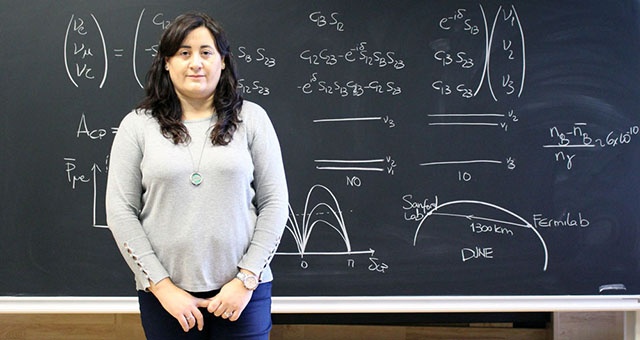Mariam Tórtola Baixauli, researcher at the Institute for Corpuscular Physics (UV-CSIC) has won one of the five L’Oréal-UNESCO research awards “For Women in Science” in Physical Sciences of this year, of 15,000 euros. The proposal of the Valencian Physics consists of the study of subtle differences between matter and antimatter trough neutrinos oscillation observed by the DUNE experiment, in EE. UU, in which the IFIC is participating.
The project of Mariam Tórtola will study the ability of the DUNE experiment -one of the most ambitious project in neutrino physics in the world- for measuring the called CP violation in neutrino oscillations. DUNE, currently in construction, will send the highest-intensity neutrino beam on the planet from Fermilab (Chicago) to a large detector in Sanford Underground Research Laboratory (South Dakota), 1,300 kilometres downstream of the source. Scientifics will observe with an unprecedented precision, how this subatomic particle “oscillates” and turn into the three existing types during its tour.
If DUNE is able to fully observe CP violation (charge conjugation and parity, two properties of subatomic particles) in neutrinos behaviour, it would be a great step to solve one of the biggest mysteries of Physic: the asymmetry between matter and antimatter, or why our Universe is made of matter and not of its opposite particles.
Moreover, the IFIC researcher will study another of the enigmas that surround the mysterious neutrino: the differences between the masses of the three types of neutrinos. The rest of subatomic particles also repeats these differences between the three families that exist, without even knowing why.
Another of the award-winning proposals is the analysis of phenomena beyond the Standard Model, the theory that describes elementary particles and their interactions. Mariam Tórtola belongs to the international group dedicated to studying these issues in DUNE, with which this award contributes to her work of searching for new interactions of neutrinos, as well as a fourth type of neutrino, known as sterile neutrino, which would not interact at all with matter except, possibly, by gravity.
Mariam Tórtola Baixauli (Valencia 1977) is a Ramón y Cajal researcher at the Universitat de València at the Institute for Corpuscular Physics. She completed her licenciatura (former Spanish undergraduate degree) and PhD studies in Physics at the Universitat de València under the direction of José W. Furtado Valle, conducting research stays at the Max Planck Institute of Physics (Munich, Germany), the Centre for Particle Theoretical Physics of the Higher Technical Institute of the University of Lisbon (Portugal), Institute for Theoretical Physics of the University of Hamburg (Germany) and the Centre for Research and Advanced Studies of the National Polytechnic Institute (Cinvestav) in Mexico. In 2008 he won the prize of the Royal Society of Physics and the BBVA Foundation as a new researcher in Theoretical Physics.
The L’Oréal-UNESCO research awards 'For Women in Science' are destined to research centres to support projects carried out by Spanish scientists during 2018. They must be under 40 years old and develop their project in an area of Physical Sciences. The awards have an amount of 15,000 euros each one.
The jury of this edition of the awards, which for twelve years has supported 52 Spanish scientists with more than 890,000 euros, is chaired by Pedro Miguel Echenique, Professor of Condensed Matter Physics, president of the Donostia International Physics Centre (DIPC) and 1998 Prince of Asturias Award for Scientific and Technical Research. Along with him, there are other renowned scientifics included Teresa Rodrigo, professor of Atomic Physics at the University of Cantabria, member of the scientific Committee of CERN and director of the Physic Institute of Cantabria; Avelino Corma, founder of the Institute for Chemical Technology of Valencia UPV-CSIC; and Pilar López Sancho, doctor in Physical Sciences and research professor at the CSIC at the Materials Science Institute of Madrid.


